AAR Japan
Interview Date: April 2018
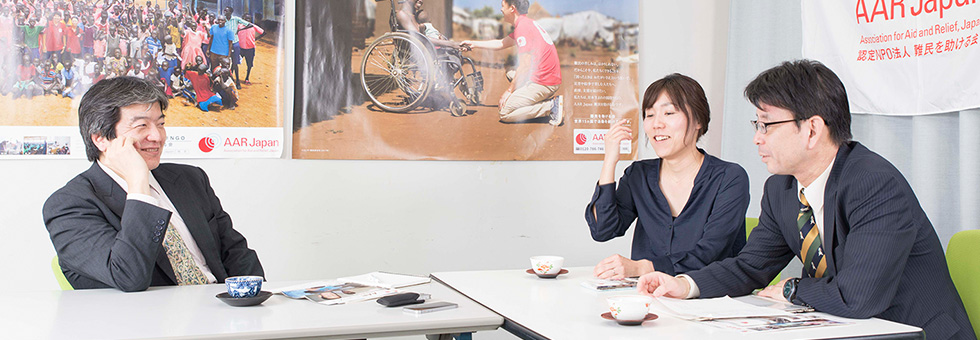
- Interview :
-
AAR Japan
Mr. Yoshiaki Horie, Ms. Chiaki Furukawa
As an internationally recognized NGO born in Japan, known through television commercials, 'AAR Japan [Association for Aid and Relief, Japan]』。
was established in 1979 with the aim of supporting Indochinese refugees, expanding its areas of activity, and has delivered support to over 60 countries and regions. FLEXSCHE Corporation has been supporting this organization since 2011.
This time, we visited the Tokyo office in Meguro to ask Mr. Yoshiaki Horie, the then Secretary-General, and Ms. Chiaki Furukawa, who has been involved in support activities in various fields such as Haiti for a year and a half and mine action in Afghanistan, about the detailed activities and the reality of the support.
-

Executive Director & Secretary-General (COO) *at the time
Mr. Yoshiaki Horie
After working for an international transportation company, he joined AAR Japan at the age of 30. Since then, he has been handling office work in Tokyo while repeatedly going on short overseas business trips, engaging in support activities in over 40 countries. Currently, as the Secretary-General, he is responsible for coordinating office staff and overseeing the overall operation of the association.
-

Assistant Secretary-General & Program Manager
Ms. Chiaki Furukawa
After gaining experience at a human resources consulting company, she went to the UK to study international development at a graduate school. After returning to Japan, she was in charge of support in Haiti for a year and a half as a resident staff member of AAR Japan from 2010, and has since been involved in activities in dangerous areas such as Afghanistan and Myanmar. She is currently responsible for operations at the Tokyo office.
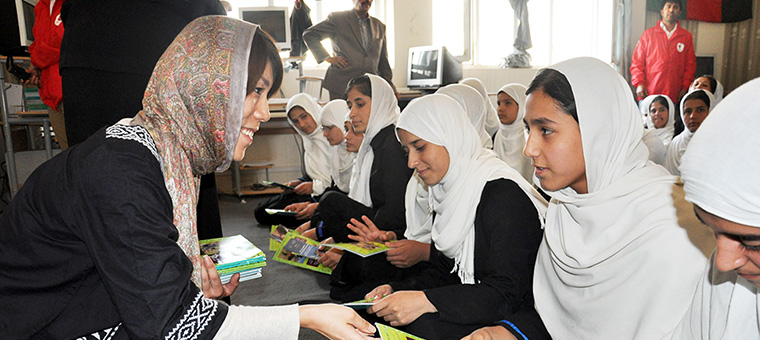
Born in Japan
International NGO Organization
What kind of organization is 'AAR Japan [Association for Aid and Relief, Japan]' (hereinafter referred to as AAR)?

HorieWe are an international NGO organization that focuses on activities such as refugee support, emergency support during disasters both domestically and internationally, support for people with disabilities, mine action, and awareness activities. We have provided support in over 60 countries and regions, and are currently active in 15 countries including Myanmar, Afghanistan, Turkey, Zambia, and Japan (as of June 2018). Recently, we also started supporting Myanmar refugees in Bangladesh from October 2017.
What was the background to the establishment of the association?
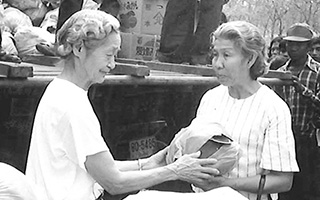
Former Chairperson Yukika Soma (left) distributing supplies at a refugee camp on the Thai-Cambodian border

HorieIt was in 1979 that former Chairperson Yukika Soma founded AAR. The late 1970s was a time when Indochinese refugees were emerging. Refugees, known as boat people, were arriving in Japan, but the Japanese government was very reluctant to grant them settlement rights, only providing temporary care. In such a situation, Soma received a letter from a Canadian friend saying, "Japan does not accept refugees, and even if you go to refugee camps around the world, there are no Japanese volunteers. Japan is a cold country." Feeling that Japan would become isolated from the international community if things continued as they were, Soma was determined to create a citizen group to support refugees from a private standpoint, gathered colleagues, and realized the establishment of the association. At that time, it was established as the 'Association to Aid Indochinese Refugees'.
It is an organization that started from an individual's desire.

HorieThat's right. The staff who gathered at that time were completely volunteers. At the time of its launch, it was also featured in newspaper articles, and many people agreed with the activities, and it is said that donations amounting to 100 million yen were collected in the first four months. At that time, they taught refugees who came to Japan, used the collected money for scholarships, dispatched nurses to overseas refugee camps, and provided financial support to other organizations.
After that, the scope of activities expanded.

HorieThe refugee problem was not limited to Indochina, but existed worldwide in places like Afghanistan, Palestine, and East Africa, so in 1984, the association was relaunched as an organization to support refugees worldwide, not just in Indochina, and the name was changed to 'Association for Aid and Relief, Japan'. Subsequently, by seeing the situation on the ground in refugee camps, they realized that there were layers of people who were difficult to reach with support, and began supporting people with disabilities. Furthermore, realizing that landmines were a cause of disabilities, they also started mine action.
Please tell us about the characteristics of AAR.

HorieFirst of all, it is a private organization specializing in refugee support that was first born in Japan, and it does not lean towards politics, ideology, or religion. As a citizen group, we always have a strong awareness of wanting to be an organization that is supported by as many people as possible, without relying too much on public support in terms of funding.
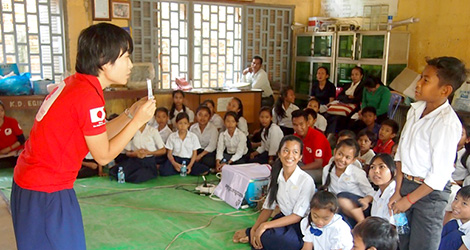
As part of improving the educational environment for children with disabilities, we are conducting awareness activities about disabilities (Cambodia)
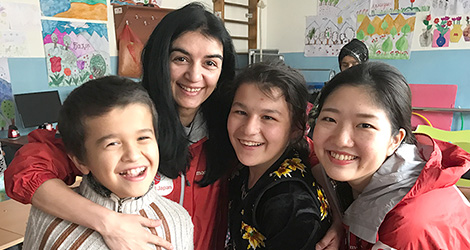
Children with disabilities who are supported in schooling, local staff, and resident staff (Tajikistan)
Please tell us about the relationship between FLEXSCHE Corporation and AAR.

UranoWe have been making donations to AAR since 2011. The trigger was the Great East Japan Earthquake. In addition, in 2013 and 2015, our company was the title sponsor of a billiards tournament called 'FLEXSCHE Cup', where we provided a corner of the venue and set up a booth. I believe this also contributed to AAR's publicity.

HorieAt the FLEXSCHE Cup, as a result, we were also able to appear on the radio program (J-Wave 'Jam the World') of Mr. Jun Hori (journalist and caster/former NHK announcer), who was the host of the tournament. It is very important for us to have our activities widely known, so it was a grateful opportunity that attracted the interest of a wide range of people.
It was triggered by the Great East Japan Earthquake, but why did you choose AAR as the recipient of donations among the many organizations that were active at the time?

UranoOne of the criteria when considering donation recipients was "an organization that can carry out activities with immediate effect for people who need help right now."

HorieAt that time, there were many donations of the type called "relief funds," which are distributed equally to victims about six months after the disaster occurs. What we receive is "support funds," which are used for activities that are needed now.

UranoAlso, the fact that there is no political or religious bias was an important point. Additionally, we had the impression that their initial response after the disaster was likely to be quick, which was also one of the reasons.

HorieThat's right. You really can't understand the true situation unless you go to the site. The information received from the media and the internet is not always accurate and is often lacking. The site is also in chaos, so we believe it is necessary to go there immediately and determine what needs to be done. During the Great East Japan Earthquake, the first team entered the site the day after the next. In Tohoku, we are still focusing on supporting the independence of people with disabilities and those who have evacuated due to the impact of the nuclear power plant.

UranoThe first year's donation from FLEXSCHE Corporation was designated for the Great East Japan Earthquake, but from the following year, it was changed to donations targeting all activities of AAR, and it continues every year.
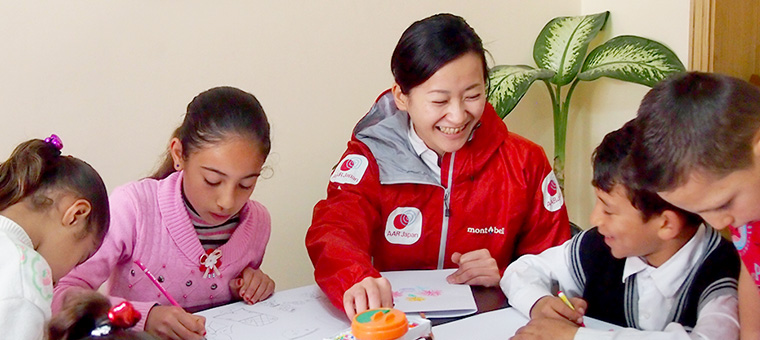
International Cooperation
People on the Ground
Mr. Horie, what kind of work did you do in your previous job?

HorieAfter graduating from university, I worked for six years at a private company in the transportation sector, primarily engaged in international shipping, including overseas assignments. However, being in a large organization, I somehow saw my future too clearly, and to change that, I quit my job at the age of 30.
And after that, why did you choose to work in international cooperation?
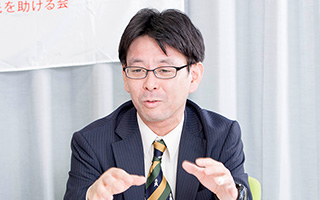

HorieAt that time, living in Japan without any struggles for food, clothing, and shelter, I compared myself to the unfortunate people around the world and felt it was "unfair." I was contemplating whether there was a way to rectify the reality of such disparities just because of the different places of birth. With such thoughts, I randomly searched for "refugees" on the internet, and AAR came up at the top. When I opened their homepage, there was a page for job recruitment, and with the thought of "trying it out for about a year," I applied, which was the beginning.
After that, you have been working on refugee support and other activities worldwide, haven't you?

HorieBasically, I have been working in Tokyo all the time, conducting refugee support and disaster relief in the form of business trips. Currently, I am working as the Secretary-General, responsible for the administrative staff.
Why did you choose AAR, Mr. Furukawa?

FurukawaSince I was a child, I have been sensitive to words like "world" and "conflict," and I was interested in the world of international cooperation. I think the era when the Berlin Wall fell and the Gulf War occurred during my elementary school years also influenced me. When I was in high school, I had the opportunity to study in the United States for a mid-term period, where I learned about the existence of a field called "Peace Studies," which further increased my interest. However, in my 20s, I did not pursue a path in international cooperation and worked as a human resources consultant in Osaka. At that time, my annual income was much better than it is now, but like Horie, at the age of 30, I decided to "reconsider what I want to do" and went to a university in the UK to study International Development.
Did you decide to pursue a path in international cooperation?
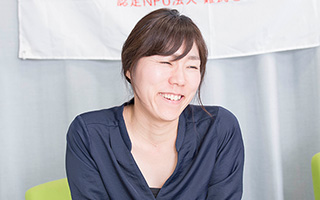

FurukawaOf course. And while writing my master's thesis, I started job hunting, encountered AAR, got an interview opportunity, and was hired. Since it was a position as a resident staff, I worked in Haiti for a year and a half afterward. I often go to dangerous areas, such as working on landmine countermeasures in Afghanistan and Myanmar. Currently, my main work is in the Tokyo office, but I also go to the field during emergency support.

HorieAt the start of support activities, I also often travel for the foundation of subsequent activities.
By the way, how many people are there as staff at AAR?

HorieDomestically, there are 48 people at the Tokyo office, 2 each at the Saga and Sendai offices, and overseas, there are about 31 Japanese resident staff and 170 locally hired staff.

UranoWhen you post job openings, do you get enough applicants?

FurukawaThere are many applications.

HorieYes, but many people decline after being hired. I hear reasons like getting accepted by another organization or being opposed after consulting with their family. After all, compared to jobs involving international cooperation at the UN, the treatment is not as good (laughs).

FurukawaIndeed (laughs).
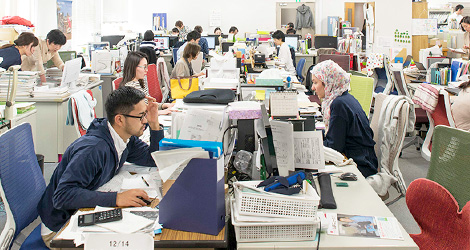
The office is a bit cramped for the number of people.
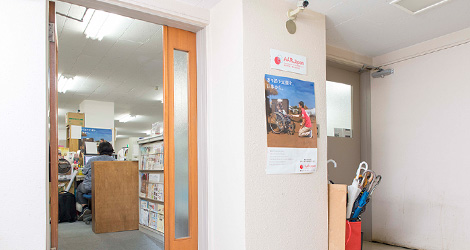
The office is on the 7th floor of a building that is 47 years old.
There are no recruitments for new graduates, are there?

HorieThat's right. Honestly, we don't have the capacity to train people. Many of the staff come from private companies or have experience with the Japan Overseas Cooperation Volunteers.

UranoWhen I looked at the office floor, there seemed to be many women.
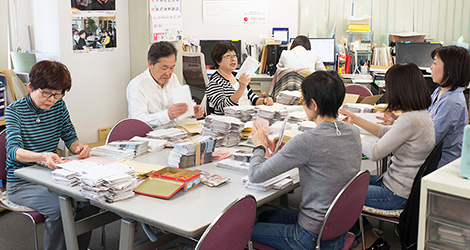
There are also unpaid volunteer staff at the office who handle administrative tasks such as preparing mailings.
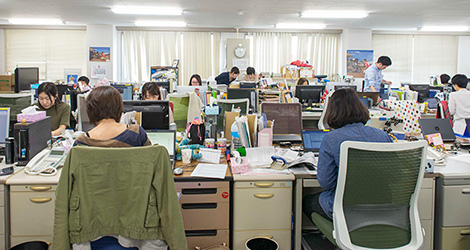
Many female staff are actively working.

HorieAbout 60% to 40% are women. One reason is that the treatment can be a hurdle for men who need to support their family's income, but AAR was founded by a woman, and the current chairperson is also a woman, so I think it's an organization where women can thrive.

FurukawaHowever, depending on the country of operation, gender can be an important factor. For example, in Islamic regions, women's roles in society are often limited, so it might be easier for men to handle negotiations and discussions related to projects. However, if only male staff are dispatched for that reason, it becomes extremely difficult to capture women's voices. For instance, when conducting surveys to formulate projects, male staff alone cannot hear from women. But the real needs are held by those who cannot voice them. Therefore, in the world of support, it is desirable to have both men and women working equally.
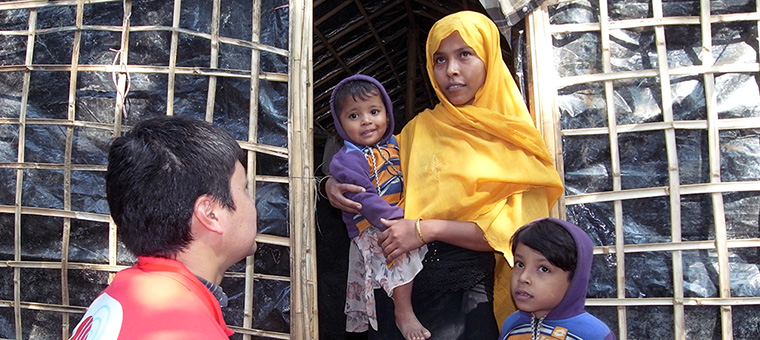
It involves danger,
but it is a valuable activity.
What exactly do you do in landmine countermeasures?
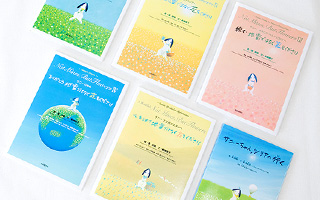
"Give Us Flowers, Not Mines" series, all volumes

HorieThe content includes several aspects. First, the most straightforward is landmine removal. This requires technology and involves danger, so we do not do it directly but cooperate with organizations like the UK's "The HALO Trust." In addition, we support landmine victims and conduct awareness-raising activities through picture books (like "Give Us Flowers, Not Mines"). The net proceeds from the picture books are used for landmine countermeasure activities.

FurukawaWe also conduct landmine avoidance education on-site. We go around villages to educate people on how to avoid accidents caused by landmines. For example, in Afghanistan, it is said that there are over 10 million landmines. The entire country is contaminated with landmines, and it will be a long time before they are completely removed. Therefore, for them, landmines are something they have to coexist with. Living safely next to a minefield is like traffic safety in Japan.

UranoWhat are the tips for living safely near a minefield?

FurukawaFor example, not going near tanks or staying away from facilities that are obviously ruins due to shelling are basic principles. There are also international standard marks indicating minefields. For example, if white stones are lined up, it means the area has been cleared of mines, or if red stones are placed, it indicates a minefield ahead. By the way, blue stones indicate the presence of unexploded ordnance. There are also local marks, but knowing such information is important.
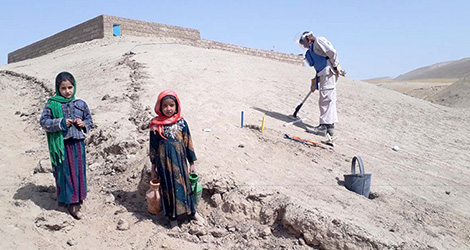
Children heading to fetch water passing by landmine removal activities (Afghanistan)
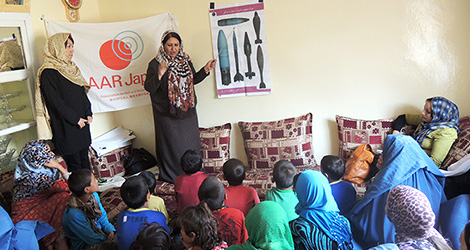
We convey knowledge to protect against landmine damage using posters and other means (Afghanistan)

UranoDo you indicate dangerous areas with stones? Recently, I went on a company trip to Cambodia, and having such knowledge beforehand would change how you see the scenery at your destination.

HorieIn Cambodia, instead of stones, skull marks are used. Such marks differ by country, and in tropical regions, they are indicated with wooden sticks instead of stones. In dry regions like Afghanistan, stones are used because wooden sticks might be removed and used as firewood. The principle is to use something that no one in the area values to mark minefields.
How successful has AAR been in its landmine countermeasures?

FurukawaIn Afghanistan, where AAR has been continuing landmine countermeasures since 1999, by February 2018, we secured the safety of land equivalent to 560 Tokyo Domes, removing 4,856 landmines and 22,310 unexploded ordnances. We have conducted landmine avoidance education for 873,956 people.

UranoThat's an impressive achievement.
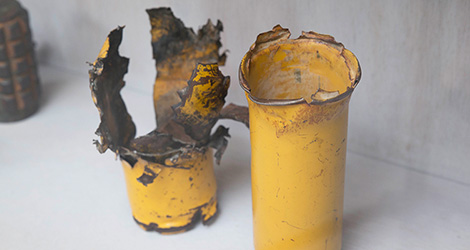
Cluster bomb submunitions. These submunitions are contained in a parent bomb that explodes in the air, causing widespread damage.
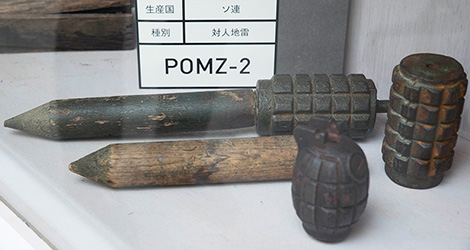
(Back) A landmine that is set up by driving a stake into the ground, which explodes when the wire attached to the detonator is pulled. (Front) Hand grenade
What are the challenges you face in this line of work?
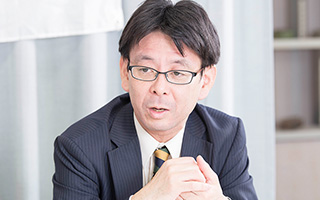

HorieIt's the management of the organization, or rather, the financial juggling. We are currently active in 15 countries, but conversely, we can only provide support in 15 countries. Even when we go on-site, the number of people seeking help is overwhelming, and the reality is that we can't reach most of them. It feels like we're deciding who won't receive support rather than providing it. When we enter the field, the UN and other NGOs are also present, so we strive to avoid any gaps, waste, or inconsistencies in support while coordinating with them, but I constantly feel that we are not providing enough support. I believe there is still a long way to go in terms of providing adequate support.
Do you mainly rely on donations for your operational funds?

HorieWe are supported by many individuals and corporations, and we also use proceeds from charity goods sales and concert revenues as operational funds, but a significant portion comes from subsidies from the Japanese government. Compared to overseas NPOs, the scale of donations is small. Thanks to the effect of AC Japan's TV commercials, our recognition has increased, and our activities are becoming easier, but many people in Japan still have a distrust of NPOs as a whole. Due to some instances of misconduct, the entire sector is viewed with suspicion. The social standing is also low. In the West, even NPOs and NGOs can establish relationships where they can speak on equal terms with the government, but in Japan, it's still a long way off. Although I mentioned wanting to reduce the proportion of public funds, in reality, it has become quite large. As dependence on money increases, it becomes difficult to maintain independence as a civic organization.

UranoDo the ministries that provide funding make any demands on AAR?

HorieBasically, we are an independent organization and do not receive instructions from ministries. However, as I mentioned earlier, dependence on funding and independence are incompatible, so we want to increase private funding as much as possible.
Mr. Furukawa, what are the most challenging aspects of support activities on the ground?

FurukawaIt's especially about personal safety when going abroad. We don't operate in the midst of combat, but there are risks of illness, accidents, and even kidnapping or robbery. I have personally encountered danger before.

UranoThat's a tough job. Didn't you ever feel like quitting during such times?

FurukawaI have become more cautious than before. In fact, I think being cautious is just right. Ultimately, you are the only one who can protect yourself, so I prepare by receiving specialized training in safety to avoid getting involved in incidents or accidents, or to respond quickly if I do.
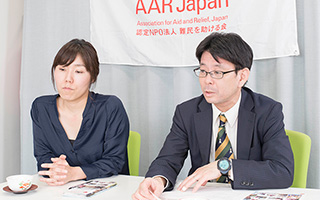

HorieThere have been staff members who have died from illness or natural disasters in the past, and the most common cause of death in this job is traffic accidents. Ensuring safety is a crucial part of our work. We can only provide support if we are safe.

FurukawaThere was also an incident in the past where a riot broke out during the distribution of supplies. We had informed them in advance that the supplies were limited, but it didn't reach everyone, and eventually, people got angry, saying, "Isn't this too little?" This was our failure, but it was truly frightening.

HorieDistributing supplies smoothly in places where many people gather is one of the challenges in our activities. For example, when supplies are limited and restrictions are set, such as only households with disabled members or female-headed households, riots can be expected from those who don't receive them. Therefore, we make arrangements such as allowing only people with coupons distributed in advance to enter the distribution site.

UranoI see. As you accumulate many achievements, such know-how also accumulates.
What drives you, Mr. Furukawa, to continue this work despite the dangers?
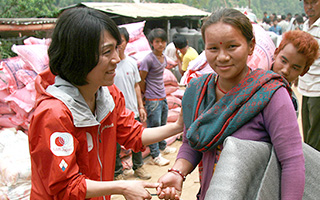
Chiaki Furukawa handing out supplies during emergency support for Nepal earthquake victims

FurukawaOnce you see the field with your own eyes... At my first activity site, an orphanage in Haiti, a newborn baby was left exposed. It was a vividness completely different from what I thought I knew from TV or photos. And that night, there was a torrential downpour, and I thought, "That baby is probably still exposed." That scene is etched in my mind. After seeing that, I can't think of quitting.
What are the challenges in your activities?

FurukawaWe often use the phrase "Do no harm." We are supposed to be there to provide support, so the worst thing is for our support activities to negatively impact the local society, but it's also a difficult thing to avoid.
What does that specifically entail?

FurukawaFor example, consider a community where a large number of people have taken refuge after a disaster. The people there, even if they are not very wealthy, want to help those in need in front of them, so they offer toilets and allow free use of wells. However, over time, toilets may break, or the well water may run dry. If support organizations only help the disaster victims, it can lead to conflicts between the victims and the local people. This is just one example, but it's challenging to prevent such situations.
What measures are there to address this?

FurukawaFirst, coordination among support organizations is key. Many support organizations rush to a single refugee camp, so without coordination on which organization will provide what support and where, support will inevitably concentrate in one place, or conversely, more people will be left without support. In Japan, during the Great East Japan Earthquake, there were people lacking supplies while food was in surplus elsewhere. Instead of ad-hoc actions like giving a blanket to someone who looks cold or handing bread to someone hungry, we, as professionals, must coordinate with other support agencies in various ways to ensure effective support.
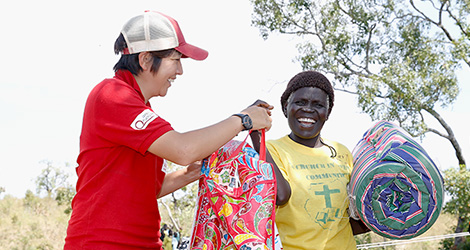
Distributing household goods and other items by hand to newly arrived South Sudanese refugees (Uganda)
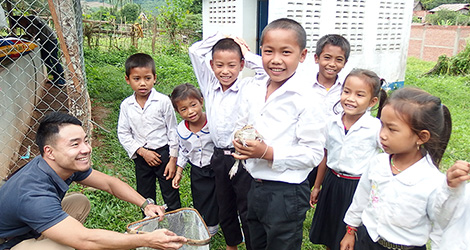
Children from a school where school meal support was provided and a resident officer (Laos)
Is coordination done through discussions among support organizations?

FurukawaMainly, the United Nations and the local government coordinate. However, due to political backgrounds, this coordination may not function well, so we must listen to both sides and the voices on the ground to reflect the needs in our support.
What is important to you in your support activities, Mr. Furukawa?

FurukawaWhen we go abroad, we are foreigners, and when we come to provide support, a power dynamic inevitably forms between us and the local people. However, especially the local staff understand the local situation better than we do and are indispensable for conducting support activities safely and efficiently. With that in mind, the mindset of "we came to help you" is obviously misguided, and I believe we are "being allowed to provide support." I always keep that mindset. Otherwise, those providing support will inevitably head in the wrong direction.
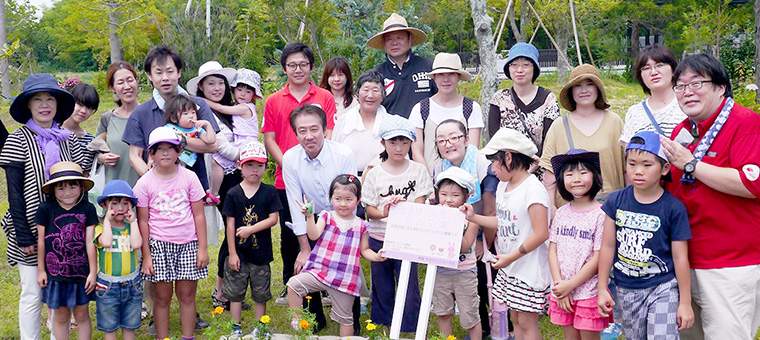
Helping people around the world,
also saving Japan
What would you like to convey to the Japanese people, as two individuals currently dedicated to international cooperation?

HorieI myself have experienced this, but when living an ordinary life in Japan, it's easy to fall into the illusion that "as long as Japan is fine, that's all that matters." However, Japan is a country that cannot exist without its relationship with the world, and if we do not act with an awareness of overseas matters, it will negatively impact us as well. Instead of being confined within the walls of Japan, we should open the doors, learn about people in difficult situations abroad, and have the mindset to solve these issues. It would be great if this awareness could increase, as eventually, our own lives will be threatened.

FurukawaThat's right. Japan is a country prone to disasters, so there will inevitably be times when we need help from abroad. We sometimes receive opinions like, "Shouldn't we help our own country before supporting others?" But as Horie says, in the end, helping neighboring countries also leads to helping ourselves.

UranoIt's the idea that kindness is not just for others, isn't it?

FurukawaExactly. It's said that young people today are becoming less interested in overseas matters, but I think it's important to first have an interest in the world. Ultimately, this also leads to understanding Japan better.
I see, thank you. When we want to support AAR, what can we do?

HorieYou can participate in various ways. First, there are donations. You can specify the purpose, such as which project or country you want to support. There's also the option of becoming a monthly supporter. Alternatively, purchasing picture books or charity goods can contribute the net proceeds to our activities.

UranoThere are also charity chocolates, and I distributed 200 of them at the FLEXSCHE Cup.

HorieMethods like "BOOK Donation," where the purchase amount of used books, DVDs, and precious metals is donated, or donations of unused stamps and miswritten postcards are also appreciated. Additionally, we are sometimes invited to give lectures. We ask for a donation of 7,000 yen or more and reimbursement of actual expenses, and we dispatch staff with experience related to themes like "disability" or "Zambia."
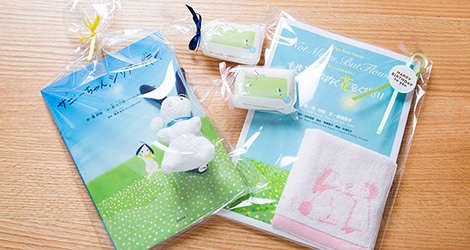
An example of charity goods
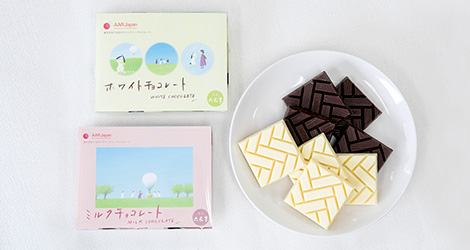
Charity chocolate
In what kind of places are you often invited to give lectures?

FurukawaWe often have classes at elementary schools, universities, and vocational schools. Additionally, for companies expanding overseas, we talk about the local situation, which helps them form their business models.

HorieWe also hold events like charity concerts and expatriate report meetings, using ticket sales and participation fees for our activities. We are also constantly recruiting volunteers.
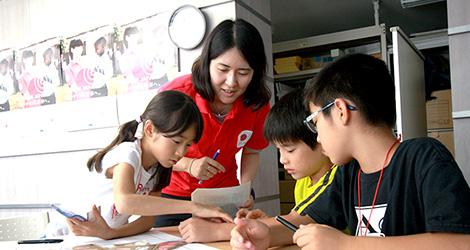
Organizing events at the Tokyo office to promote understanding of international cooperation among children
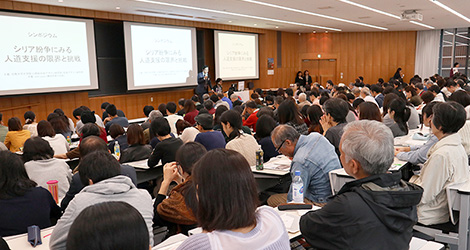
We also hold symposiums inviting experts
What kind of activities do volunteers engage in?

HorieThere are many administrative tasks like sending newsletters and receipts from the office. Volunteers also participate in international cooperation events, charity bazaars, and flea markets. Currently, about 100 people are volunteering with us.
I see, there are various ways to support.

UranoI believe that what AAR is doing is "something each of us should be doing directly." However, in reality, we all have jobs and lives, so we can't actually go to the site and engage in activities. FLEXSCHE Corporation supports by having professionals act on our behalf through donations and other means. We hope you will continue to carry out activities on our behalf. Thank you.

HorieThank you. We look forward to working with you as well.

FurukawaI'm really glad to hear that. I'll do my best.
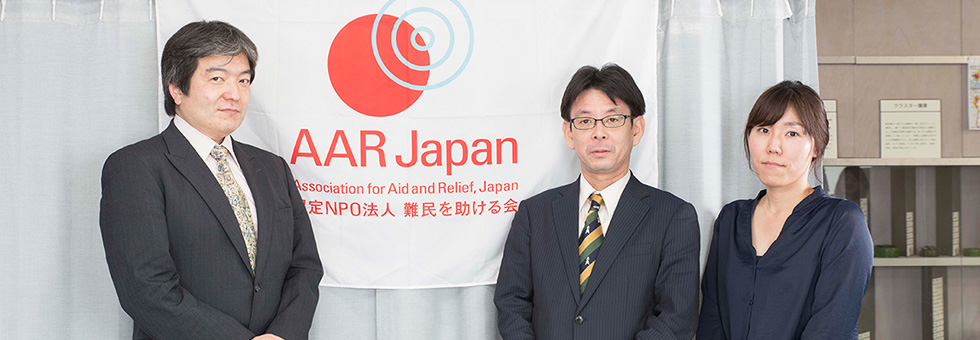
AAR Japan Public Relations and Supporter Liaison
Yuko Ogawa
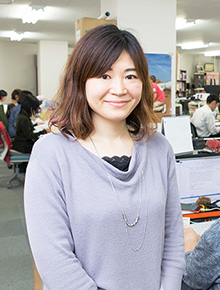
"I have been interested in international cooperation work since I was a child. I happened to be born in an environment without any inconvenience, but when I think about the fact that there are people in the world who could achieve much more than I could if they had the opportunity, I felt that I had to do something with the environment I was given," says Ogawa.
After completing graduate school and working as a public servant, she changed jobs to AAR. She is currently responsible for responding to inquiries and requests from supporters, preparing thank-you letters for donations, and activity reports, conveying the situation of local people and the thoughts of expatriates to supporters.
"On our website, we convey what kind of difficulties people face at our activity sites. We hope you will first take a look at these, and if you feel like supporting such people, please consider donating. For example, if we collect 5,000 yen, we can deliver half a month's worth of food to a family staying in Syria, where fighting continues. Your feelings will surely become hope for those who need support now."